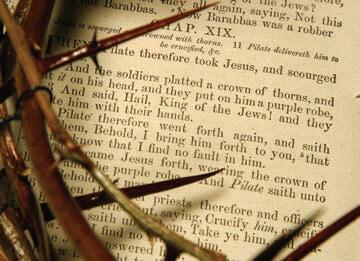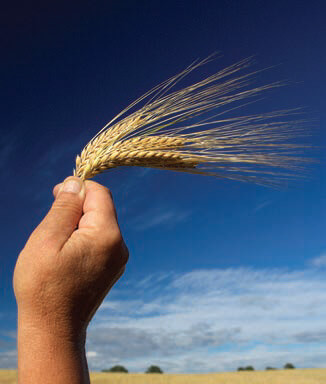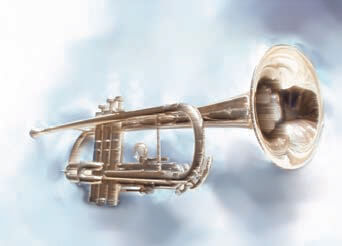Jesus Christ told His disciples that He alone knew the Father and that the revealing of the Father would be to those to whom Christ Himself would reveal Him (Matthew 11:25–27). One of the ways in which Jesus did this is through the annual Festivals. If we examine the teachings and instructions given throughout the New Testament, we find facets of the Father’s character associated with each of the Festivals. The result is that through observing the annual Festivals we can come to have an appreciation of our Heavenly Father and start to understand how these days represent His Plan for humanity. The Plan of God truly is His Holy Day Plan. And the whole Plan of God reveals the giving nature of our Heavenly Father.
The people of Christ’s day had only a very limited understanding of the being we know as God the Father. Interestingly, when Jesus spoke of His Father, the disciples did not reveal an attitude of bewilderment—“Who are you talking about?” or “What are you talking about?” They clearly showed some appreciation of the Father. Even the religious leaders were not without some comprehension of the Father, although they, as Christ said, did not “know” Him. We read: “Then they said to Him, ‘Where is Your Father?’ Jesus answered, ‘You know neither Me nor My Father. If you had known Me, you would have known My Father also’” (John 8:19).
But, then, how was Jesus to reveal the Father to the disciples and to the Church?
To appreciate how the annual Festivals picture our Father’s plan, we must remember that any such appreciation must start by our being called into a relationship with Him. Jesus Christ explained this in an oft-quoted passage, in which he told His followers, “No one can come to Me unless the Father who sent Me draws him” (John 6:44). The Father’s role in calling Christians into a relationship with Him, and with His Son, is reiterated several times in John 6. In verse 37 and again in verse 39, Jesus explains that the Father “gives” the disciples to Him.
To be disciples means that the Father has become intimately involved in our lives so we can have a relationship with both Him and His Son.
It is significant that, throughout the New Testament, the Greek word translated into English as “God” is the term theos—a term used almost exclusively in relation to the Father (except for a very few times where the meaning of the Word or Christ is clear from the context). By contrast, Jesus Christ in His glorified state is normally referenced by the Greek term kyrios, translated as “Lord” (1 Corinthians 8:6, 12:3). As a result, throughout the apostolic writings, we can be certain which member of the God Family is being addressed—even if they are not referenced as the Father or His Son, Jesus Christ. When we understand this, we can better appreciate just how much the New Testament speaks of the Father.
Passover
 The annual Festivals commence with the Passover, representing the sacrifice of Jesus Christ as “the Lamb of God who takes away the sins of the world” (John 1:29). That description makes Jesus the Lamb of the Father. John reinforces this idea as he records Jesus’ frequent teaching about His relationship with His Father. A frequently quoted scripture about Jesus—ironically one of the least understood of scriptures—is found in the Gospel of John: “For God so loved the world that He gave His only begotten Son, that whoever believes in Him should not perish but have everlasting life. For God did not send His Son into the world to condemn the world, but that the world through Him might be saved” (John 3:16–17). If you have not already done so, I urge you to read Mr. Gerald Weston’s comprehensive series of Living Church News articles about the “golden verse,” beginning with his May-June 2012 article, “God, Who Loved the World.”
The annual Festivals commence with the Passover, representing the sacrifice of Jesus Christ as “the Lamb of God who takes away the sins of the world” (John 1:29). That description makes Jesus the Lamb of the Father. John reinforces this idea as he records Jesus’ frequent teaching about His relationship with His Father. A frequently quoted scripture about Jesus—ironically one of the least understood of scriptures—is found in the Gospel of John: “For God so loved the world that He gave His only begotten Son, that whoever believes in Him should not perish but have everlasting life. For God did not send His Son into the world to condemn the world, but that the world through Him might be saved” (John 3:16–17). If you have not already done so, I urge you to read Mr. Gerald Weston’s comprehensive series of Living Church News articles about the “golden verse,” beginning with his May-June 2012 article, “God, Who Loved the World.”
Jesus as the Passover lamb was a gift from the Father—an expression of His concern for us so that we can be reconciled to Him, and through that salvation have access to eternal life. Jesus states more about the Father and His qualities at the last Passover He conducted with His disciples than in any other section of Scripture. We read of this in detail as part of our Passover service each year. The Son was revealing the Father to the disciples and to us.
Pentecost
 The Israelites were given the instructions about Pentecost in the context of a gift: the land they were about to inherit. They had come into the land, crossing the Jordan just before the Passover. Following the Passover, the miracle of manna ceased, and they were able to reap the ripening barley and subsequently wheat as they moved through the land conquering the territory. The inhabitants retreated into their walled cities out of fear of Israel, and there would have been little resistance to them taking the first harvest of the land. So we find the introduction to Pentecost or the Feast of Weeks stated in terms of the harvest of the land:
The Israelites were given the instructions about Pentecost in the context of a gift: the land they were about to inherit. They had come into the land, crossing the Jordan just before the Passover. Following the Passover, the miracle of manna ceased, and they were able to reap the ripening barley and subsequently wheat as they moved through the land conquering the territory. The inhabitants retreated into their walled cities out of fear of Israel, and there would have been little resistance to them taking the first harvest of the land. So we find the introduction to Pentecost or the Feast of Weeks stated in terms of the harvest of the land:
“And you shall count for yourselves from the day after the Sabbath, from the day that you brought the sheaf of the wave offering: seven Sabbaths shall be completed. Count fifty days to the day after the seventh Sabbath; then you shall offer a new grain offering to the Lord. You shall bring from your dwellings two wave loaves of two-tenths of an ephah. They shall be of fine flour; they shall be baked with leaven. They are the firstfruits to the Lord. And you shall offer with the bread seven lambs of the first year, without blemish, one young bull, and two rams. They shall be as a burnt offering to the Lord, with their grain offering and their drink offerings, an offering made by fire for a sweet aroma to the Lord. Then you shall sacrifice one kid of the goats as a sin offering, and two male lambs of the first year as a sacrifice of a peace offering. The priest shall wave them with the bread of the firstfruits as a wave offering before the Lord, with the two lambs. They shall be holy to the Lord for the priest. And you shall proclaim on the same day that it is a holy convocation to you. You shall do no customary work on it. It shall be a statute forever in all your dwellings throughout your generations. When you reap the harvest of your land, you shall not wholly reap the corners of your field when you reap, nor shall you gather any gleaning from your harvest. You shall leave them for the poor and for the stranger: I am the Lord your God” (Leviticus 23:15–22).
The land was a gift that Israel was never to forget. Leaving the corners of the field for the poor was a way of reinforcing the memory that the land was a gift from God. To this end, Moses also recorded: “For the Lord your God is bringing you into a good land, a land of brooks of water, of fountains and springs, that flow out of valleys and hills; a land of wheat and barley, of vines and fig trees and pomegranates, a land of olive oil and honey; a land in which you will eat bread without scarcity, in which you will lack nothing; a land whose stones are iron and out of whose hills you can dig copper. When you have eaten and are full, then you shall bless the Lord your God for the good land which He has given you” (Deuteronomy 8:7–10).
Pentecost for us is still about a gift, not of land but something infinitely greater. At the Passover, Jesus had told His disciples about that gift. “And I will pray the Father, and He will give you another Helper, that He may abide with you forever” (John 14:16).
The gift of the Holy Spirit becomes the defining symbol of Pentecost, making us the first fruits of the harvest. It was and still is to this day, a gift from our Father. So the ability to have a real relationship with the Father and His Son comes as a gift. So gifts are as relevant today as they were to Israel entering the Promised Land.
After promising the gift of the Holy Spirit from the Father, Jesus described the outcome of that gift. He described it in terms of the intimate relationship we would have with the Father; a loving, caring, sharing, instructive relationship that would prepare us for service in His Kingdom. “Jesus answered and said to him, ‘If anyone loves Me, he will keep My word; and My Father will love him, and We will come to him and make Our home with him.… These things I have spoken to you while being present with you. But the Helper, the Holy Spirit, whom the Father will send in My name, He will teach you all things, and bring to your remembrance all things that I said to you’” (John 14:23–26).
Passover was not the time for the giving of that gift. The promise was made and then fulfilled on the Day of Pentecost, 31ad. But consider this in a larger scale. The promise was clearly not just for those disciples eating a Passover meal with Jesus. As Luke records, it is a promise to all those whom the Father would call. “If you then, being evil, know how to give good gifts to your children, how much more will your heavenly Father give the Holy Spirit to those who ask Him!” (Luke 11:13).
That power and role come as a gift from the Father: the most priceless gift we could receive—the Holy Spirit of God. That allows us to appreciate spiritual issues and, above all, see this physical world through the mind of our Father and His Son. It is not just to be a remembrance at Pentecost but to be an active ingredient in our daily lives!
On the day of Pentecost, the Father fulfilled those promises. In giving His Holy Spirit to the disciples gathered in Jerusalem, it provided so that they and we who follow could be firstfruits—the “church of the firstborn”—of our Father (Hebrews 12:23).
Trumpets
 How should we view the Feast of Trumpets in this regard? We pray daily, eagerly looking forward to the return of Jesus Christ. We appreciate the incredible earth-shaking events that are to take place. But who is it that has the power to allow any of these events? Humanity cannot do so! Jesus Christ does not appear to have the power to do so! It is in the Father’s hand to ultimately determine the timing and occurrence of those events. Matthew records Jesus teaching that it was the Father only who knew the day and hour of His return (Matthew 24:36). Luke reinforces that with a subsequent teaching of Jesus, just before He ascended to His Father. “And He said to them, ‘It is not for you to know times or seasons which the Father has put in His own authority’” (Acts 1:7).
How should we view the Feast of Trumpets in this regard? We pray daily, eagerly looking forward to the return of Jesus Christ. We appreciate the incredible earth-shaking events that are to take place. But who is it that has the power to allow any of these events? Humanity cannot do so! Jesus Christ does not appear to have the power to do so! It is in the Father’s hand to ultimately determine the timing and occurrence of those events. Matthew records Jesus teaching that it was the Father only who knew the day and hour of His return (Matthew 24:36). Luke reinforces that with a subsequent teaching of Jesus, just before He ascended to His Father. “And He said to them, ‘It is not for you to know times or seasons which the Father has put in His own authority’” (Acts 1:7).
Trumpets pictures the announcement of Christ’s return to establish the Kingdom of God on planet Earth. Yet even here we can see that the event we all anticipate in celebrating the Feast of Trumpets requires the action and intervention of our Father.
Atonement
When we consider the Day of Atonement, we understand Jesus Christ as the real High Priest, of whom the Aaronic High Priest acted as a type. The High Priest performed all of the actions in the tabernacle or temple on that day. Leviticus 16 sets out the detailed events that had to be performed by the High Priest on that day. It was the only day of the year in which the High Priest was able to enter the Holy of Holies—during which time he sprinkled the blood of the sacrifices on the Mercy Seat over the Ark of the Covenant.
So, Jesus Christ, as the true High Priest, was then responsible for performing all those actions. We must then ask ourselves to whom was He performing those actions and presenting the blood that had to be sprinkled on the Mercy Seat? The answer to that question helps us understand who was providing the atonement for sin as a result of that blood. The High Priest was presented with two goats before the altar for divine selection. One was for the Lord, and its blood had to be sprinkled in the Holy of Holies. The other was the goat that was to be taken away. The goat representing Christ reminds us again of the Father’s gift. And who was it that determined the result of the casting of lots for the two goats? Was it time and chance? Surely not. It is the Father who orchestrates and controls the events that Atonement pictures.
The Father, then, is the ultimate being who is responsible for us being brought together as one—at-one-ment! He does this through the actions of His Son, our true High Priest. Our Father desires the reconciliation of humanity to Himself.
Tabernacles
 The Feast of Tabernacles is the high point of the year for us in terms of the Holy Days. The concept of the Kingdom of God with the dramatic changes being made for the benefit of all humanity and the creation is awesome to consider. Our part in that Kingdom is something that the Father is eagerly awaiting. He desires us to have our part. Jesus taught us: “Do not fear, little flock, for it is your Father’s good pleasure to give you the Kingdom” (Luke 12:32).
The Feast of Tabernacles is the high point of the year for us in terms of the Holy Days. The concept of the Kingdom of God with the dramatic changes being made for the benefit of all humanity and the creation is awesome to consider. Our part in that Kingdom is something that the Father is eagerly awaiting. He desires us to have our part. Jesus taught us: “Do not fear, little flock, for it is your Father’s good pleasure to give you the Kingdom” (Luke 12:32).
Do you realize how long it has been that the Father has looked forward to that event? Note the beginning of that pleasure and desire on the Father’s part as described by Jesus. “Then the King will say to those on His right hand, ‘Come, you blessed of My Father, inherit the kingdom prepared for you from the foundation of the world” (Matthew 25:34).
Our Father has been anticipating rewarding His children with the Kingdom since the beginning of everything. It is the ultimate blessing He wishes to bestow on His family; the blessing He has been waiting to give to us from the beginning (Genesis 1:26).
The Last Great Day
 The Last Great Day pictures the period when those not called in this day and age will have the opportunity to have a relationship with our Father and His Son. They will have the privilege to appreciate the gifts of our Father’s calling, the giving of His Son, the gift of the Holy Spirit and many of the other benefits He has given to us. Our role will be to serve them and help them understand the greatness of the gifts they are then receiving. We will teach them that the change in environment into which they are resurrected came about because of obedience to our Father.
The Last Great Day pictures the period when those not called in this day and age will have the opportunity to have a relationship with our Father and His Son. They will have the privilege to appreciate the gifts of our Father’s calling, the giving of His Son, the gift of the Holy Spirit and many of the other benefits He has given to us. Our role will be to serve them and help them understand the greatness of the gifts they are then receiving. We will teach them that the change in environment into which they are resurrected came about because of obedience to our Father.
In summary, the annual Festivals provide a way for us to have a relationship with our Father. Many Protestants like to talk about being “Christ-centered,” but in doing so fail to understand what this really means. We cannot be properly “Christ-centric” unless we also understand the Father’s role, and Christ’s role in our establishing a relationship with the Father. Certainly we deeply value the sacrifice of Jesus Christ. But why do we value it so highly? Because it allows us to enter into a relationship with God the Father. The very ability for a Christian to have the “mind of Christ” is made possible by the gifts of our Father. And this is only possible because of the Father, whom we thank for the resurrected and living Christ who is our High Priest, by whose life we are saved (Romans 5:10)
So we find Paul making comments to the Churches such as, “for it is God who works in you both to will and to do for His good pleasure (Philippians 2:13) and “And do not be drunk with wine, in which is dissipation; but be filled with the Spirit, speaking to one another in psalms and hymns and spiritual songs, singing and making melody in your heart to the Lord, giving thanks always for all things to God the Father in the name of our Lord Jesus Christ” (Ephesians 5:18–20).
The annual Festivals therefore put the statement of James into an interesting context. “Every good gift and every perfect gift is from above, and comes down from the Father of lights, with whom there is no variation or shadow of turning. Of His own will He brought us forth by the word of truth, that we might be a kind of firstfruits of His creatures” (James 1:17–18).
James talks of the Father’s gifts and we being firstfruits, which brings us back to where we started. What was the purpose of the gifts offered by our Father in the first place? “But you are a chosen generation, a royal priesthood, a holy nation, His own special people, that you may proclaim the praises of Him who called you out of darkness into His marvelous light” (1 Peter 2:9).
Indeed, the Holy Days enable us to appreciate the great generosity of our Heavenly Father. What an awesome plan He and His Son Jesus Christ have in place for their creation!